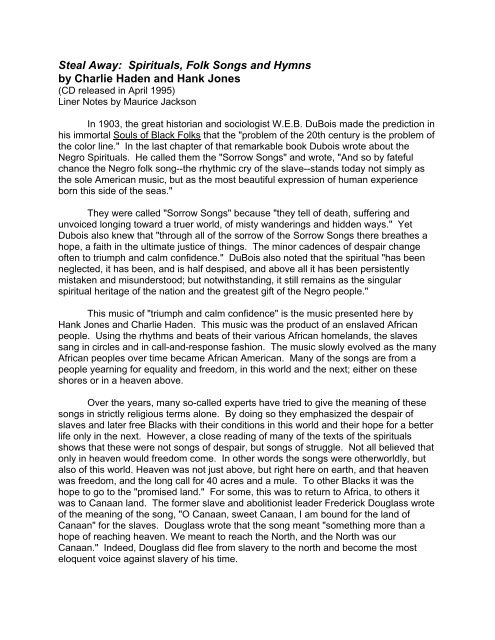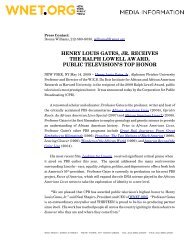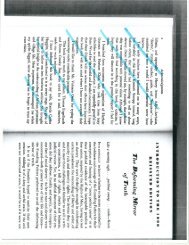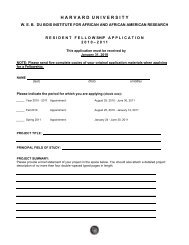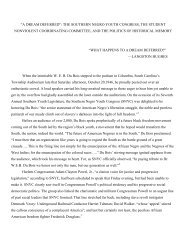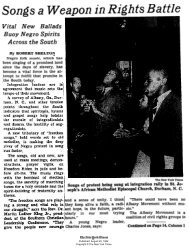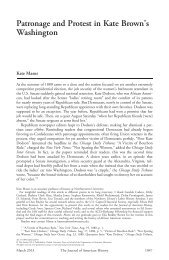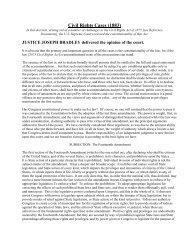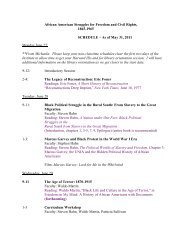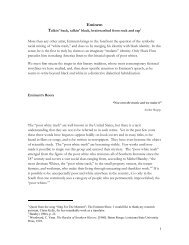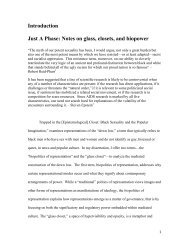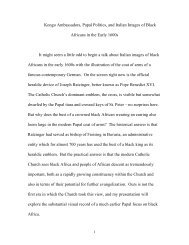Steal Away: Spirituals, Folk Songs and Hymns by Charlie Haden ...
Steal Away: Spirituals, Folk Songs and Hymns by Charlie Haden ...
Steal Away: Spirituals, Folk Songs and Hymns by Charlie Haden ...
Create successful ePaper yourself
Turn your PDF publications into a flip-book with our unique Google optimized e-Paper software.
<strong>Steal</strong> <strong>Away</strong>: <strong>Spirituals</strong>, <strong>Folk</strong> <strong>Songs</strong> <strong>and</strong> <strong>Hymns</strong><br />
<strong>by</strong> <strong>Charlie</strong> <strong>Haden</strong> <strong>and</strong> Hank Jones<br />
(CD released in April 1995)<br />
Liner Notes <strong>by</strong> Maurice Jackson<br />
In 1903, the great historian <strong>and</strong> sociologist W.E.B. DuBois made the prediction in<br />
his immortal Souls of Black <strong>Folk</strong>s that the "problem of the 20th century is the problem of<br />
the color line." In the last chapter of that remarkable book Dubois wrote about the<br />
Negro <strong>Spirituals</strong>. He called them the "Sorrow <strong>Songs</strong>" <strong>and</strong> wrote, "And so <strong>by</strong> fateful<br />
chance the Negro folk song--the rhythmic cry of the slave--st<strong>and</strong>s today not simply as<br />
the sole American music, but as the most beautiful expression of human experience<br />
born this side of the seas."<br />
They were called "Sorrow <strong>Songs</strong>" because "they tell of death, suffering <strong>and</strong><br />
unvoiced longing toward a truer world, of misty w<strong>and</strong>erings <strong>and</strong> hidden ways." Yet<br />
Dubois also knew that "through all of the sorrow of the Sorrow <strong>Songs</strong> there breathes a<br />
hope, a faith in the ultimate justice of things. The minor cadences of despair change<br />
often to triumph <strong>and</strong> calm confidence." DuBois also noted that the spiritual "has been<br />
neglected, it has been, <strong>and</strong> is half despised, <strong>and</strong> above all it has been persistently<br />
mistaken <strong>and</strong> misunderstood; but notwithst<strong>and</strong>ing, it still remains as the singular<br />
spiritual heritage of the nation <strong>and</strong> the greatest gift of the Negro people."<br />
This music of "triumph <strong>and</strong> calm confidence" is the music presented here <strong>by</strong><br />
Hank Jones <strong>and</strong> <strong>Charlie</strong> <strong>Haden</strong>. This music was the product of an enslaved African<br />
people. Using the rhythms <strong>and</strong> beats of their various African homel<strong>and</strong>s, the slaves<br />
sang in circles <strong>and</strong> in call-<strong>and</strong>-response fashion. The music slowly evolved as the many<br />
African peoples over time became African American. Many of the songs are from a<br />
people yearning for equality <strong>and</strong> freedom, in this world <strong>and</strong> the next; either on these<br />
shores or in a heaven above.<br />
Over the years, many so-called experts have tried to give the meaning of these<br />
songs in strictly religious terms alone. By doing so they emphasized the despair of<br />
slaves <strong>and</strong> later free Blacks with their conditions in this world <strong>and</strong> their hope for a better<br />
life only in the next. However, a close reading of many of the texts of the spirituals<br />
shows that these were not songs of despair, but songs of struggle. Not all believed that<br />
only in heaven would freedom come. In other words the songs were otherworldly, but<br />
also of this world. Heaven was not just above, but right here on earth, <strong>and</strong> that heaven<br />
was freedom, <strong>and</strong> the long call for 40 acres <strong>and</strong> a mule. To other Blacks it was the<br />
hope to go to the "promised l<strong>and</strong>." For some, this was to return to Africa, to others it<br />
was to Canaan l<strong>and</strong>. The former slave <strong>and</strong> abolitionist leader Frederick Douglass wrote<br />
of the meaning of the song, "O Canaan, sweet Canaan, I am bound for the l<strong>and</strong> of<br />
Canaan" for the slaves. Douglass wrote that the song meant "something more than a<br />
hope of reaching heaven. We meant to reach the North, <strong>and</strong> the North was our<br />
Canaan." Indeed, Douglass did flee from slavery to the north <strong>and</strong> become the most<br />
eloquent voice against slavery of his time.
It is nearly impossible to give an author or the origin to many of the Negro<br />
spirituals. This is true of many folk songs throughout the world because many were<br />
conceived <strong>and</strong> sung long before the words were written down or the musical score<br />
noted. But many of the songs performed here have been so established in tradition that<br />
we may piece together some of their meanings <strong>and</strong> histories.<br />
Legend <strong>and</strong> considerable historical facts tell us that the title tune, "<strong>Steal</strong> <strong>Away</strong>,"<br />
may have been written <strong>by</strong> Nat Turner, who in 1831, led one of largest slave revolts in<br />
North America, in Southampton County, Virginia. Look closely at the words enclosed in<br />
these notes:<br />
"the trumpet sounds within-a my soul,<br />
I ain't got long to stay here,<br />
<strong>Steal</strong> a-way, steal a-way, steal a-way to Jesus<br />
<strong>Steal</strong> a-way, steal a-way home, I ain't got long to stay here"<br />
One can imagine Turner <strong>and</strong> his fellow conspirators using these words as they<br />
gather themselves to seek their freedom. The song was used as a code to convene<br />
secret meetings <strong>by</strong> Turner to plan the aborted revolt. In the vocal renditions of "<strong>Steal</strong><br />
<strong>Away</strong>," the congregation <strong>and</strong> the leader exchange responses, just as Turner did with his<br />
fellow men <strong>and</strong> women <strong>and</strong> as Jones does with <strong>Haden</strong>.<br />
"It's Me, O Lord" is an old favorite of Hank Jones. Jones was born in Vicksburg,<br />
Mississippi, but like so many African-Americans during the first decades of the 20th<br />
century, he moved north, to Pontiac, Michigan, outside of Detroit. Many of the songs<br />
Jones performs here with <strong>Charlie</strong> <strong>Haden</strong>, he heard as a youth as part of the legendary<br />
Jones Family musicians. The second verse of the song reveals it's meaning:<br />
"Tain't my mother or my father but it's me O, Lord<br />
St<strong>and</strong>in in the need of prayer,<br />
Tain't the deacon or my leader but it's me O, Lord,<br />
St<strong>and</strong>in in the need of prayer."<br />
Far from showing the selfishness of the singer, the song reflects one's own<br />
responsibility for his or her actions.<br />
"Nobody Knows the Trouble I See" is a staple of any performance or recording of<br />
Negro spirituals. The original words were, "Nobody Knows de Trouble I See, Nobody<br />
Knows like Jesus." But in some performances the word "like" is substituted with "but"<br />
thus changing the entire meaning of the song. The slaves knew that other Blacks <strong>and</strong><br />
fair-minded whites did underst<strong>and</strong> their plight. The second verse goes<br />
"Brothers will you pray for me<br />
An help me to drive ole Satan away?"<br />
For the enslaved African, Satan was the devil <strong>and</strong> the devil was also the slave<br />
owner.
"Spiritual" was written <strong>by</strong> <strong>Charlie</strong> <strong>Haden</strong> as a tribute to Martin Luther King Jr.,<br />
Medgar Evers <strong>and</strong> Malcolm X, all slain in the 1960s while seeking social, racial <strong>and</strong><br />
economic justice. The song was first performed on the "Dreamkeeper" album <strong>by</strong> <strong>Haden</strong><br />
<strong>and</strong> the Liberation Music Orchestra accompanied <strong>by</strong> the Oakl<strong>and</strong> Youth Chorus.<br />
<strong>Charlie</strong> also played the song in Washington, D.C. with the Duke Ellington High School<br />
for the Performing Arts Chorus. The album was itself inspired <strong>by</strong> the poem <strong>by</strong> the same<br />
name written <strong>by</strong> Langston Hughes.<br />
Many believe that "Wade in the Water" was written <strong>by</strong> Harriet Tubman. Most<br />
assuredly it was a song she often sang as she led slaves along the "Underground<br />
Railroad" to freedom in the north. The slaves immersed themselves in water as they<br />
crossed rivers on their way to freedom, which also symbolically represented earlier<br />
African norms of total immersion in the water during religious rites. Used along with<br />
other songs such as "Follow the Drinking Gourd," i.e., the Big Dipper, slaves used<br />
these songs to gather, to plan secret meetings, to unite, to worship <strong>and</strong> to follow the<br />
north star to freedom.<br />
"Swing Low, Sweet Chariot" is another of the well-known spirituals. During<br />
slavery, the first verse was usually sung <strong>by</strong> a leader <strong>and</strong> the Congregation followed.<br />
The song is today performed either <strong>by</strong> a soloist or full congregation in unison. The song<br />
tells of the struggle to reach Jordan: "if you get there before I do, tell all my friends I'm<br />
comin too...." Harriet Tubman also sang this song as a secret code to tell other slaves<br />
that she would be there to aid them. Indeed she was called the "Moses of her people."<br />
"Sometimes I Feel Like a Motherless Child" is perhaps the best known of the<br />
spirituals to wider audiences. The words, "Sometimes I feel like a Motherless child, A<br />
Long Way from home," can be fit into any situation <strong>by</strong> any person feeling low. Indeed,<br />
throughout the years many of the songs have been sung <strong>by</strong> people acquainted only with<br />
the lingering melodies of the songs <strong>and</strong> not with the actual words or their meanings.<br />
However, James Weldon Johnson, author of the African American anthem, "Lift Every<br />
Voice <strong>and</strong> Sing," <strong>and</strong> his brother J. Rosamond Johnson, in their 1925-1926<br />
masterpiece, The Book of American Negro <strong>Spirituals</strong> have shown how Blacks often<br />
changed the words to their own songs which often changed the mood <strong>and</strong> the meaning.<br />
In this case the words would read more defiantly:<br />
Sometimes I feel like an eagle in the air<br />
Some-a dese mornin's bright an' fair<br />
I'm goin' to lay down my heavy load;<br />
Goin to spread my wings an' cleave the air.<br />
"L'amour De Moi," is a French Canadian folk song, brought over from France in<br />
the 16th century <strong>and</strong> originally called "L'amour de moy" which means my love. It's no<br />
surprise that <strong>Charlie</strong> <strong>Haden</strong> chose this song. <strong>Charlie</strong> was born in Shen<strong>and</strong>oah, Iowa,<br />
<strong>and</strong> sang with the legendary <strong>Haden</strong> Family on the radio, in churches <strong>and</strong> at fairs. As a
youth he heard <strong>and</strong> sang folk songs, spirituals <strong>and</strong> hymns. <strong>Charlie</strong> first heard "L'amour<br />
De Moi" sung <strong>by</strong> Paul Robeson on an album entitled "Live Performance at The Royal<br />
Albert Hall," London, August 10, 1958. <strong>Charlie</strong> has always admired the music, artistry<br />
<strong>and</strong> courage of Robeson. And like Robeson he too has travelled the world listening to<br />
indigenous music of the native peoples. For his courage, <strong>Charlie</strong> was once jailed in<br />
Portugal for playing his song, "Song for Che" that he dedicated to the people of Angola<br />
<strong>and</strong> Mozambique who were fighting for national independence from Portugal in the<br />
1970s. And of course much is known about Robeson's persecution <strong>and</strong> loss of<br />
passport <strong>and</strong> income because he protested McCarthyism, helped to organize labor <strong>and</strong><br />
sang for freedom-loving people in dozens of countries.<br />
Most of us need no introduction to the Irish-American folk song, "Danny Boy." It<br />
too was sung in the tradition of the Negro <strong>Spirituals</strong> <strong>by</strong> Paul Robeson as an expression<br />
of his love of the music of the peoples of the world, <strong>and</strong> with the Irish people.<br />
"I Got a Robe" is one of the more upbeat <strong>and</strong> faster of the spirituals. Blacks<br />
clearly believe that they too are God's chosen, <strong>and</strong> laugh at their oppressors who surely<br />
won't rule in heaven as they have on earth. Just as you may want to dance <strong>and</strong> sing as<br />
you hear this tune just imagine the slaves singing <strong>and</strong> dancing as they sang this song,<br />
knowing that one day they would be free.<br />
I got a robe, You got a robe,<br />
All God's children got a robe.<br />
When I get to heaven gonna put on my robe,<br />
Gonna shout all over God's Heaven, Heaven, Heaven!<br />
Everybody talkin' 'bout heaven ain't going there,<br />
Heaven, heaven.<br />
Gonna shout all over God's Heaven!<br />
If there is one song that African American <strong>and</strong> whites have shared over the last<br />
30 years it is "We Shall Overcome." Pete Seeger tells the story of adapting it from the<br />
song "I'll Overcome" also called "I'll be All Right." The "I" becomes "we" in the collective<br />
struggle for Civil Rights for all Americans, <strong>and</strong> for those in other l<strong>and</strong>s who have also<br />
identified it with their own struggles. Put to use <strong>by</strong> the late Dr. Martin Luther King Jr., it<br />
became the anthem of the Civil Rights Movement. <strong>Charlie</strong> first recorded it on his first<br />
Liberation Music Orchestra album, as a tribute to those demonstrating at the 1968<br />
Democratic Party National Convention.<br />
Noted historian, leader <strong>and</strong> activist since the 1960s Civil Rights movement,<br />
Vincent Harding in his seminal work, There is a River, believes that "Go Down Moses"<br />
was either
written or inspired <strong>by</strong> Denmark Vesey, a free Black who in Charleston, South Carolina,<br />
planned a massive slave revolt:<br />
Go down, Moses<br />
Way down in Egypt l<strong>and</strong>.<br />
Tell ole Pharoah,<br />
Let my people go!<br />
"Go Down, Moses" is also well known to many. I can remember playing it in the<br />
high school b<strong>and</strong>. But it did not sound like this. This was another song that Blacks<br />
used to spread the word of their plans for freedom. It was used in the Underground<br />
Railroad <strong>and</strong> in more overt forms of resistance. It relates the plight of the enslaved<br />
African to that of the early Israelites. Perhaps along with "<strong>Steal</strong> <strong>Away</strong>," "Go Down<br />
Moses" was among the favorites during the Civil Rights era especially in the churches<br />
where many of the marches <strong>and</strong> boycotts were organized.<br />
The last of the spirituals is "My Lord, What a Mornin." While it reveals a sadness<br />
concerning the human condition of the Blacks, the verses have a dual meaning. "My<br />
Lord what a mornin when the stars begin to fall" later refrains into "You'll hear the<br />
trumpet sound to wake the nation's underground." This seemingly is a reference to the<br />
signal that will be given to join the Underground Railroad to freedom. In fact, in later<br />
years when the slave owners figured out the meaning of some of these songs, they<br />
banned the songs, the gathering of slaves in large numbers <strong>and</strong> even their religious<br />
services. During the U.S. Civil War, African American soldiers sang these songs as<br />
they gathered in circles at evening camp meetings, much like their mother <strong>and</strong> fathers<br />
sang in circles in Africa. A white company comm<strong>and</strong>er, Colonel Thomas Wentworth<br />
Higginson was so moved <strong>by</strong> the words <strong>and</strong> rhythms of the songs that he wrote about<br />
them in his 1870 book, Army Life in a Black Regiment.<br />
The last part of the recording is a medley of hymns. Just as Hank heard the<br />
spirituals as a youth, <strong>Charlie</strong> heard <strong>and</strong> sang these hymns with his family. The hymns<br />
unlike the spirituals were written down <strong>and</strong> their origin can be traced. These songs<br />
were written <strong>by</strong> whites but unlike the spirituals they were sung <strong>by</strong> Black <strong>and</strong> white<br />
people. It is interesting to note that some of the earlier white musicologists tried to claim<br />
that the Blacks could not have written the "Negro <strong>Spirituals</strong>" because their intelligence<br />
<strong>and</strong> human condition would not have allowed them to construct such melodies. The<br />
African Americans never minded singing the hymns realizing that they too were full of<br />
hope <strong>and</strong> beauty. As for the earlier claim that Blacks stole from the earlier hymns,<br />
ethno-musicologists have clearly refuted this showing the intricate links between the<br />
<strong>Spirituals</strong>--their African rhythm, melody <strong>and</strong> lyrics--<strong>and</strong> the Black experience in America.<br />
The first of the hymns, "Abide with me! Fast Fall the even tide" was written in<br />
1847 <strong>by</strong> Scottish-born Henry Francis Lyte. Most of his life was spent preaching among<br />
the fisherman <strong>and</strong> sailors in Lower Brixam, Engl<strong>and</strong>. In 1861, William Henry Monk,<br />
doctor of
Music <strong>and</strong> choir director of King's College, Cambridge, put Lyte's verse to music <strong>and</strong> it<br />
has been with us ever since.<br />
"Just as I am Without One Plea" was written <strong>by</strong> the Englishwoman Charlotte<br />
Elliot in 1836. Sick <strong>and</strong> frail most of her life, the song first appeared in the second<br />
edition of a work called "The Invalid's H<strong>and</strong>book." The song reflected her thoughts<br />
about her conditions. Feeling dismal <strong>and</strong> unworthy because of her ailments, she asked<br />
a visiting minister what she must do to be saved. His response was that God would<br />
accept her just as she was. Thus the words, "Just as I am." It is no wonder that this<br />
song was adopted <strong>by</strong> those that sang the spirituals. The music was written in 1849 <strong>by</strong><br />
William B. Bradbury a noted composer of the time.<br />
"What a Friend we Have in Jesus" is known to many people. Although some<br />
attribute the words to Horatius Bonar, it was in fact written <strong>by</strong> Joseph Scriven, with the<br />
original title "A Song in the Night." Born in Engl<strong>and</strong> in 1820, he emigrated to Canada in<br />
1845. He learned about his mother's illness in far off Engl<strong>and</strong> <strong>and</strong> unable to visit her,<br />
wrote her a letter <strong>and</strong> poem. Later a friend came upon it <strong>and</strong> Charles C. Converse set it<br />
to music around 1875.<br />
The last of the hymns, "Amazing Grace," was written in 1799. Although arguably<br />
one of oldest songs presented here, it still retains its vibrancy. Perhaps that is because<br />
many of us sang it in church but also know the renditions <strong>by</strong> Aretha Franklin, Joan Baez<br />
<strong>and</strong> Mahalia Jackson. It too has been used as a song <strong>by</strong> anyone in need of hope<br />
regardless of color or creed. The song was written <strong>by</strong> Sir John Newton, a reformed ship<br />
captain of slave ships <strong>and</strong> slave trader. The words reflect his "seeing the light."<br />
"Amazing Grace, How Sweed the Sound<br />
That saved a wretch like me<br />
I once was lost but now I'm found<br />
Was Blind but Now I see."<br />
These songs performed here as well as the entire body of Negro <strong>Spirituals</strong> were<br />
first performed in public <strong>by</strong> The Fisk Jubilee Singers of Fisk University, Nashville, Tenn.<br />
in 1871. The Jubilee Singers later travelled to Europe on a triumphant tour to raise<br />
funds to keep the ensemble alive. Here nine young African-American men <strong>and</strong> women<br />
(eight of whom were born under slavery) went to Europe to seek funds unobtainable at<br />
home. In Europe they were gloriously received.<br />
In 1925, the young Paul Robeson again awakened the world to these songs.<br />
The New York Times critic wrote about his concert at the Greenwich Village Theater,<br />
"It's their cry from the depths, this universal humanism, that touches the heart....Sung <strong>by</strong><br />
one man, they voiced the sorrow <strong>and</strong> hopes of a people."<br />
A few years later in 1939, the great diva Marian Anderson was asked to perform<br />
her rendition of these songs at Constitution Hall, the theater of the Daughters of the<br />
American Revolution. Because of its policy of racial segregation, the DAR would not
allow the concert to be held there. One great lady saved the day. Then First Lady<br />
Eleanor Roosevelt <strong>and</strong> others arranged for Ms. Anderson to sing at the Washington<br />
Monument with more than 75,000 people--Black <strong>and</strong> white--braving the cold on Easter<br />
Sunday to hear her sing to the world the music of her people. Mrs. Roosevelt was a<br />
champion of civil rights. She had long prodded her husb<strong>and</strong>, President Franklin D.<br />
Roosevelt, to sign an anti-lynching law, to resign from a racially restricted country club<br />
in Georgia, <strong>and</strong> to open up the New Deal to Blacks.<br />
In the 1940s Duke Ellington performed some of these songs at Carnegie Hall.<br />
However, it was during the Civil Rights era of the 1960s that the "Freedom Singers" <strong>and</strong><br />
other groups like activist <strong>and</strong> scholar Bernice Johnson Reagon began to resurrect the<br />
legacy of these songs <strong>and</strong> put them to use as they protested the segregation of the Jim<br />
Crow south.<br />
In the mid-1970s Archie Shepp <strong>and</strong> Horace Parlan, recorded an album, "Goin<br />
Home," in duet form that placed before jazz audiences renditions of the spirituals as did<br />
Hank Jones of earlier recorded versions of "It's me O Lord." In recent years both opera<br />
soprano Kathleen Battle <strong>and</strong> mezzo-soprano to soprano diva Jesse Norman have sung<br />
<strong>and</strong> recorded the spirituals together at Carnegie Hall <strong>and</strong> in separate works.<br />
In 1994 we also witnessed an important tribute to Negro spirituals with the 26-<br />
part series Wade in the Water: African American Sacred Musical Traditions, produced<br />
<strong>by</strong> National Public Radio in collaboration with the Smithsonian Institution under the<br />
guidance of Prof. Bernice Johnson Reagon.<br />
I first heard my gr<strong>and</strong>mother sing these songs as she washed the clothes of the<br />
rich white people in the Piney Woods of Alabama during the Civil Rights era. I later<br />
heard them as a student at Fisk University on many lonely nights as I watched the<br />
Jubilee Singers rehearse in the chapel 100 years after their founding. And there I<br />
pondered the fate of my country, of Vietnam, <strong>and</strong> myself, as many of my friends went off<br />
<strong>and</strong> died unwillingly in a war that was not their own. And today as a scholar <strong>and</strong><br />
activist, these songs remain with me.<br />
In music as beautiful as the words of Tubman, Douglass <strong>and</strong> DuBois, Mr. Jones<br />
<strong>and</strong> Mr. <strong>Haden</strong> place these haunting melodies before us. Hear the plea, sing along, cry,<br />
<strong>and</strong> then smile the smile of a triumphant people who have endured all, resisted the<br />
bitterest of oppression, then <strong>and</strong> now; <strong>and</strong> yet have kept alive their spirit, their hope <strong>and</strong><br />
their dignity. Wake up <strong>and</strong> shout "My Lord What a Mornin," <strong>and</strong> then "Reach Out <strong>and</strong><br />
Touch Somebody's H<strong>and</strong>"..."Lifting Them as You Rise." And ask yourself as Dr. DuBois<br />
did "Is such a hope justified? Do the Sorrow <strong>Songs</strong> ring true?" Just listen to Hank <strong>and</strong><br />
<strong>Charlie</strong>, <strong>and</strong> you will have the answer.<br />
January 1995<br />
-- Maurice Jackson<br />
Georgetown University<br />
Washington, D.C.
Maurice Jackson is an historian of colonial North America focusing on issues of<br />
race <strong>and</strong> slavery <strong>and</strong> of revolutionary struggles in 17th <strong>and</strong> 18th century America,<br />
Engl<strong>and</strong>, France <strong>and</strong> Haiti. But it is as a jazz lover, educator <strong>and</strong> 20-year social activist<br />
in Washington, D.C., that I know him best. Ruth <strong>and</strong> I consider Maurice, his wife, Laura,<br />
<strong>and</strong> their children, Lena <strong>and</strong> Miles among our dear friends.<br />
Maurice has just began work on his doctoral dissertation. He later plans to write<br />
a social biography on the French-born Anthony Benezet (1713-1784), who moved to<br />
Philadelphia, became a Quaker <strong>and</strong> was a leading figure in the anti-slavery movement<br />
in France, Britain <strong>and</strong> America. Benezet founded the African Free School in<br />
Philadelphia where he taught Absalom Jones <strong>and</strong> Richard Allen, founder of the A.M.E.<br />
church.<br />
<strong>Charlie</strong> <strong>Haden</strong><br />
Janurary 1995


